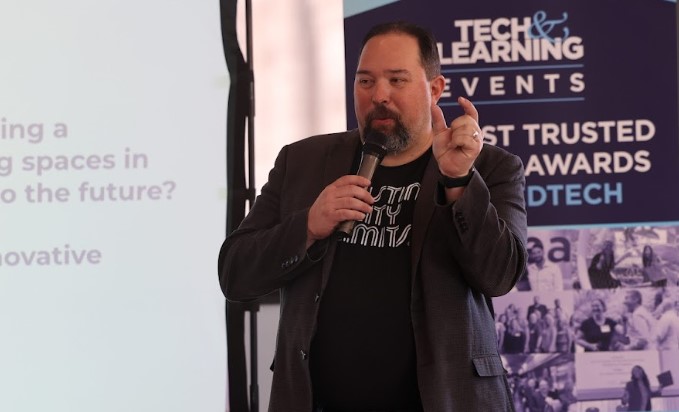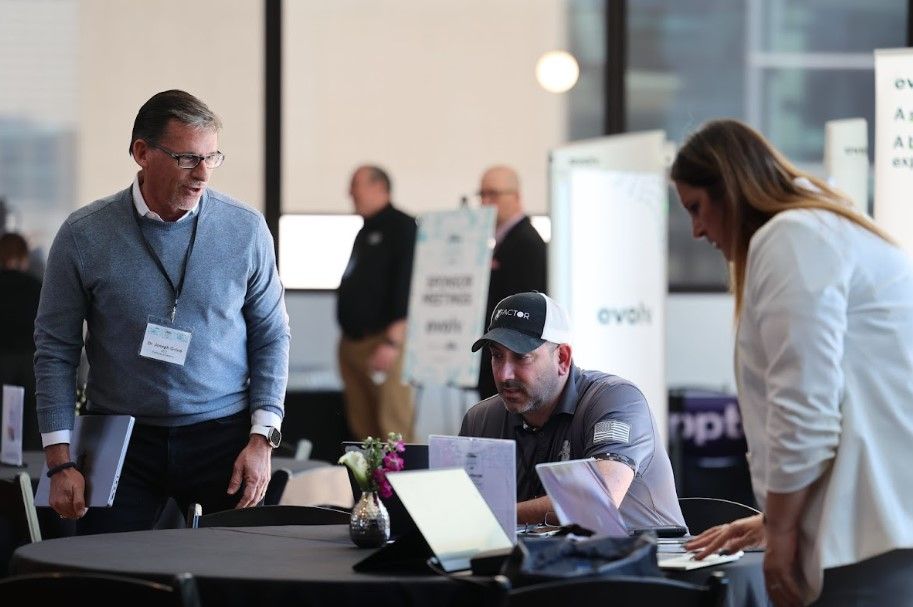Tech & Learning’s first-ever Utah Regional Leadership Summit in Salt Lake City brought together leading minds in technology and education to delve into the convergence of innovation, learning, and leadership. Focusing on emerging technologies such as AI, Augmented Reality/Virtual Reality (AR/VR), esports, and the application of design thinking in educational settings, the conference provided a rich platform for collaboration, exchanging ideas, and actionable insights.
Tech & Learning partnered with the Utah Coalition for Educational Technology for this pre-conference learning opportunity at the Leonardo Museum.
During the conference, several conversations explored AI’s transformative potential in revolutionizing educational practices. Event emcee Carl Hooker showcased AI-powered learning, instructional ideas, and intelligent content creation tools. Discussions emphasized the importance of ethical AI deployment, data privacy, and ensuring inclusivity in AI-driven educational solutions. Leaders in the field highlighted the need for continuous research and development to harness AI’s full potential in enhancing teaching, learning, and administrative processes.

One spotlight session by Dr. Shannon Putnam highlighted AR/VR technologies and emphasized the immersive and experiential learning capabilities for learners of all ability levels. Educators shared success stories of using immersive tech simulations for complex subjects, and examples of AR/VR content creation tools were offered, enabling attendees to explore innovative ways to integrate these technologies into curricula. Discussions centered on scalability, accessibility, and the role of AR/VR in fostering creativity and critical thinking skills.
Esports continues to grow in popularity in school districts, and the session presented by esports expert Audra Yocom, Director of Technology Education for Success in Education, a nonprofit serving every school district in the state of Utah with core education-based programs, explored the potential of esports to engage students and teach valuable skills such as teamwork, strategic thinking, and digital citizenship. How esports programs have a positive impact on student retention, academic performance, and career readiness was a point of focus, while panel discussions addressed concerns around screen time, gaming addiction, and the need for establishing responsible gaming guidelines.
I presented the day’s final session focused on design thinking methodologies, particularly on fostering a culture of innovation within classrooms and schools. Participants learned how design thinking principles could be applied to tackle challenges such as curriculum design, pedagogical innovation, and instruction. Attendees also discussed how to use design thinking to reimagine learning spaces, develop student-centered solutions, and build a culture of continuous improvement and experimentation.
A Special Thank U(tah) To Our Partners!
UCET Conference Bonus
Following the Leadership Summit, Tech & Learning joined the first-ever Utah Educational Library Media Association (UELMA) and Utah Coalition for Educational Technology (UCET) combined state conference, which kicked off at the Salt Palace Convention Center.
This event brought together educators, librarians, technology specialists, and administrators from across the state to explore innovative practices, tools, and educational resources. Tech & Learning was a partner and supported numerous sessions to add to the event.
ISTE CEO Richard Culatta kicked off the event with content focused on the core message of his book Digital for Good: Raising Kids to Thrive in an Online World. His keynote emphasized the importance of fostering inclusive learning environments, leveraging technology responsibly, and preparing students for the challenges and opportunities of the 21st-century workforce.
The conference featured diverse breakout sessions covering various themes and topics relevant to educators and technology specialists, and Tech & Learning had the honor of hosting a room featuring a variety of edtech innovative speakers. These sessions included:
Digital Literacy and Citizenship: Workshops equipped educators with strategies and resources to teach digital literacy skills and promote responsible digital citizenship among students.
STEM Education and Maker Spaces: Presentations showcased innovative approaches to STEM education, including integrating maker spaces, robotics, and coding activities into the curriculum to foster creativity, problem-solving, and hands-on learning experiences.
Blended Learning and Personalized Instruction: Educators shared best practices for implementing blended learning models and leveraging technology to personalize instruction, differentiate learning experiences, and meet students’ diverse needs.
AI In Education: These sessions explored its transformative impact on education. Topics included AI-driven personalized learning, adaptive assessment, and data analytics for student success. Ethical considerations in AI deployment, fostering inclusivity, and empowering educators with AI tools were also discussed. Participants engaged in hands-on workshops and shared best practices for AI integration.
The vendor expo allowed attendees to explore the latest edtech solutions, digital resources, and available learning platforms. Attendees were able to enjoy demonstrations, hands-on activities, and special discounts for conference attendees.
From inspiring keynote presentations to interactive breakout sessions and a vibrant vendor expo, the UCET Conference and the Utah Regional Leadership Summit provided attendees with valuable insights, resources, and networking opportunities to support their professional growth and enhance student learning outcomes.

